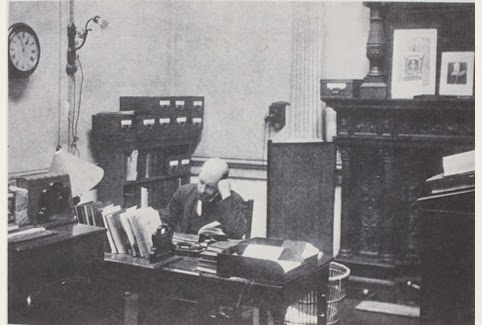We stopped at: "An emerald set in the ring of the sea."
(a few lines after the poem starting "Bound
thee forth, my booklet, quick")
(Gabler 9.102)
(Penguin p. 238)
Lyster in his office (thanks to Bill Brockman)
Stephen, Russell, Eglinton, Lyster and Best are immersed
in talk at the library. Russell, Eglinton, Lyster and Best were people who
existed in real life. They are sometimes referred to by their actual names and
sometimes by their pseudonyms, which can become rather confusing. Here's the
cast:
Russell
(pen name: A. E.): George Russell was something of a literary
giant of the time. He was poet, philosopher, artist, journalist, and economic
theorist all at once. As a poet committed to mystical experience, he was also a
dominant figure in the Irish renaissance around the turn of the century (the
phrase he "oracled out of the shadow" at 9.46 renders something of
the mysticism he was interested in). In real life, Russell was instrumental in
publishing Joyce's short stories Dubliners
in The Irish Homestead, and Joyce
owed a lot to him.
Eglinton:
John Eglinton is the pseudonym of William Kirkpatrick Magee. Both in the
novel as in life, he was an accomplished critic and influential figure on the Dublin
literary scene.
Lyster: Thomas W. Lyster ("the quaker librarian" 9.1) was the Librarian
of the National Library of Ireland from 1895 to 1920. He translated a biography
of Goethe.
Best:
Richard Irvine Best was the assistant librarian of the
National Library in 1904.
The
library men are discussing approaches to and the relation between art, life and
literature. Their debate appears to be about two opposing views on
whether literature should be seen in the author's biographical context or not.
Some of the theories they bring up were in the air at the time and would have
been well known among literary people. In talking about the
pros and cons of using the facts of Shakespeare's life to interpret his art, they also
throw around pet phrases (a well known one of Russell's was: "Art has
to reveal to us ideas, formless spiritual essences" 9.48), clichés ("Seven is dear to the mystic mind. The
shining seven WB calls them." 9.27) and rather unoriginal, received wisdom on Shakespeare. At the
same time, they snub Stephen by mockingly inquiring into his Hamlet theory. Stephen counters by taking the chance to show
off his knowledge of Aristotle and Plato. Indeed, we may pick up some of
the tension between the men from the very beginning of the chapter, or at least
note that Lyster seems to be feel the need to appease ("Urbane, to
comfort them, the quaker librarian purred." 9.1).
Much of the episode so far is told as if perceived
through Stephen's eyes and in his language. His thoughts are strewn in between
the bits of conversation, letting us have all the debris of Stephen's reading. Some
of them are dense, enigmatic, but some quite poetic also: "Hold to the
now, the here, through which all future plunges to the past" (9.89).
This is where it may be appropriate to remember one of
Joyce's famous quotations: "I've put in so many enigmas and puzzles that it will
keep the professors busy for centuries arguing over what I meant, and that's
the only way of insuring one's immortality" (in Richard Ellmann's biography, James Joyce, p. 521) – with thanks to
Rolf Wespe for making reference to this quotation during the reading.
